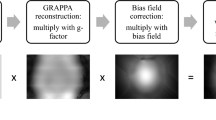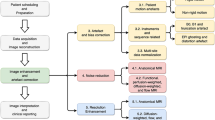Zusammenfassung
Magnetic resonance imaging (MRI) is widely acknowledged as one of the most diagnostically valuable and versatile medical imaging techniques available today, characterized by its exceptional soft tissue contrast, the absence of ionizing radiation, and the capability to acquire multiple different image contrasts. However, low signal-to-noise ratio (SNR) is a common challenge, particularly in low-field MRI scans, leading to reduced image quality and impaired diagnostic value. The effectiveness of traditional denoising methods, such as bilateral filters (BFs), heavily relies on the choice of hyperparameters. In contrast, deep learning approaches like convolutional neural networks (CNNs) are computationally demanding, require paired noisy and noise-free data for supervised learning, and often struggle to generalize to different magnetic resonance (MR) image contrasts. To bridge the gap between traditional denoising methods and deep learning, we employ a novel approach that combines a neural network comprised of trainable BF layers. This network is trained using an extended version of Stein’s unbiased risk estimator (SURE) as a self-supervised loss function, which estimates the mean squared error (MSE) between the denoised image and the unknown noise-free ground truth by incorporating a noise level map [1]. Our experiments demonstrate the effectiveness of our self-supervised approach, with the BF network outperforming the CNN by 14.7% in terms of peak signal-to-noise ratio (PSNR) when tested on unseen MR image contrasts. In conclusion, our research introduces a novel approach to address noise reduction challenges in MRI, particularly in low-SNR scenarios and across different MR image contrasts. The combination of trainable BF layers and SURE-based model supervision holds potential for future research in medical imaging, as it eliminates the dependency on noise-free training data, demonstrating parameter-efficiency, robustness and enhanced diagnostic outcomes even in the presence of unseen MR image features.
Chapter PDF
Similar content being viewed by others
References
Pfaff L, Wagner F, Hossbach J, Preuhs E, Maul N, Thies M et al. Robust multi-contrast MRI: denoising using trainable bilateral filters without noise-free targets. Proc ISBI. IEEE. 2023:1–5.
Author information
Authors and Affiliations
Corresponding author
Editor information
Editors and Affiliations
Rights and permissions
Copyright information
© 2024 Der/die Autor(en), exklusiv lizenziert an Springer Fachmedien Wiesbaden GmbH, ein Teil von Springer Nature
About this paper
Cite this paper
Pfaff, L. et al. (2024). Abstract: Robust Multi-contrast MRI Denoising using Trainable Bilateral Filters without Noise-free Targets. In: Maier, A., Deserno, T.M., Handels, H., Maier-Hein, K., Palm, C., Tolxdorff, T. (eds) Bildverarbeitung für die Medizin 2024. BVM 2024. Informatik aktuell. Springer Vieweg, Wiesbaden. https://doi.org/10.1007/978-3-658-44037-4_11
Download citation
DOI: https://doi.org/10.1007/978-3-658-44037-4_11
Published:
Publisher Name: Springer Vieweg, Wiesbaden
Print ISBN: 978-3-658-44036-7
Online ISBN: 978-3-658-44037-4
eBook Packages: Computer Science and Engineering (German Language)





